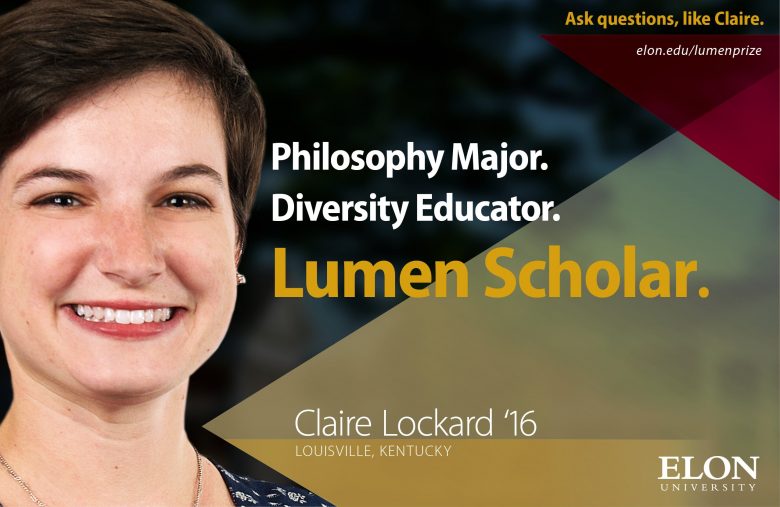Elon senior Claire Lockard used the Lumen Prize, the university’s top award for undergraduate research and creative achievement, to reconceptualize what is meant by "identity" and reimagine the possibilities for diversity on college campuses.
 By Sarah Collins ‘18
By Sarah Collins ‘18
When Claire Lockard first arrived at Elon University, the Kentucky native noted the way discussions about diversity on campus took shape – and Lockard started to question how universities everywhere could make these conversations more productive.
Time and again, Lockard returned to a basic question to which there is no agreed upon answer: How do you define “diversity”?
“I noticed that people were having trouble getting out of stuck conversations about diversity,” said Lockard, now a senior philosophy major from Louisville. “It seemed that people were having the same conversations over and over again without reaching any new conclusions.”
With support from the Lumen Prize, Elon University’s top prize for undergraduate research and creative achievement, Lockard made it a mission to improve such conversations, and think about ways that diversity work could be more effective. That work is the latest to be featured in a series of E-net profiles on Lumen Scholars in the Class of 2016.
Lockard traveled to some of the nation’s top universities to observe firsthand successful diversity programming. The undergraduate researcher met with leaders at Bard College, Columbia University, Amherst College and the University of Massachusetts Amherst to learn new strategies addressing issues linked to inclusiveness.
For example, at Amherst, the entire campus follows monthly diversity themes, which require each department to host themed speakers and events related to the department’s discipline. This technique could potentially work at Elon, Lockard thought.
“If the whole campus programmed around one big idea at a time, students might feel like they could access the programs more easily,” Lockard said. “Plus, having monthly themes helps students see how large issues affect lots of different identity groups in different ways.”
Another recommendation that Lockard makes is for universities to work strategically with students already on campuses. Citing philosopher Lisa Heldke’s work on what Heldke calls “persistently white colleges,” Lockard recommends that as schools like Elon recruit non-white students, they also take advantage of their demographic make-up to get white students to think critically about privilege.
For the Lumen project, Lockard offers two critiques of current diversity work on college campuses. The last chapter of her work is a re-imagination of Elon’s campus as a community that values a more fluid conception of identity and a broader understanding of privilege and difference.
The Lumen Prize provides selected students with a $15,000 scholarship to support and celebrate their academic and creative achievements. Lumen Scholars work closely with faculty mentors to pursue and complete their projects.
Efforts include course work, study abroad, research both on campus and abroad as well as during the regular academic year and summers, internships locally and abroad, program development and creative productions and performances.
The name for the Lumen prize comes from Elon’s historic motto “Numen Lumen,” Latin words for “spiritual light” and “intellectual light.”
Professor Anthony Weston served as Lockard’s mentor for the Lumen project. His personal research focuses on social change, a complement to Lockard’s focus on diversity.
“Claire’s work offers a whole new way to think about the ideal and the practice of diversity in higher education,” Weston said. “We’re not just looking for greater numbers of “different” people on campus, but for a richer and more open-ended conception of difference itself that reaches into each of us – it’s not just somebody else that’s “different” – and opens up a sense of connection and solidarity.”
Lockard’s project was inspired by personal experience. Lockard’s arrival at Elon coincided with a campus debate over Chick-fil-A Foundation’s donations to various organizations hostile to LGBTQ people and public policies. Getting involved with this issue illustrated to Lockard the limitations of diversity as it is currently discussed and practiced.
Lockard will present the diversity research in April at the National Conference for Undergraduate Research in Asheville, North Carolina. Lockard will also present this summer at the Society for Applied Philosophy’s conference in Belfast, Ireland.
In addition to the Lumen Prize research, Lockard has worked for Elon Residence Life and served as the president of Spectrum, Elon’s queer-straight alliance. Lockard sat on the Presidential LGBTQIA Task Force and is heavily involved in the Honors Fellows program.
Lockard intends to pursue a graduate degree in philosophy. Her ultimate goal is to become a college professor.
“I wanted my project to be something that people at Elon could relate to,” Lockard said. “I think my argument can open up space for new ways to think about privilege and the ways it operates differently for different people.”


